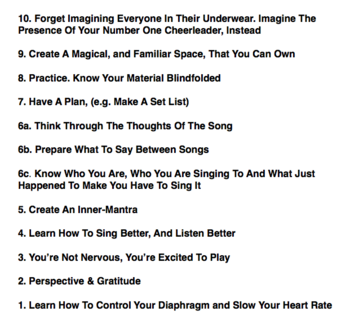"The number one way to overcome stage fright is: Learn How To Control Your Diaphragm and Slow Your Heart Rate. This is the Method of Physical Action. Constantine Stanislavsky, the inventor of Method Acting, learned that by doing a physical act, you can create a true emotion. By creating a calm, confident physicality, you will feel calmer, more confident, and be able to enjoy performance. *Learn How Below. Watch This Video Tutorial.
Here are the remaining Top Five Ways To Overcome Stage Fright. If you haven't read 10-6 yet, please read "Top Ten Ways To Overcome Stage Fright: Part 1" before continuing. I wrote this list for singing better on stage, but the techniques can be used for acting, auditioning, and presenting.
5. Create An Inner-Mantra. "Every note I sing is beautiful." Many years ago, my drummer, Rodney Howard, taught me a version of that phrase, when I was deeply struggling with an inner-critic. It changed me forever. We are constantly telling ourselves something. Two sides of our brain are working simultaneously, the creative and the analytical. You have a mantra, already. Is it "I suck?" "Do they like me?" The singing voice is particularly affected by negative feedback. Coax it. On pitch, or not, there are no bad notes, just loved ones and unloved ones. You'll sing better, if you love every note you sing.
4. Learn How To Sing Better. And Listen Better. The better you sing, the better you will feel about how you sing. Daily vocal exercises that focus on breath support, breath placement, positioning and ear training, will make you a better singer, and make you feel better about singing. When you know you're going to nail something, it's far more enjoyable than if you are hoping you will hit the high notes. Make sure your song is placed in the sweetest spot of your voice. Change the key or change the song, if you are out of your range.
It's not just what we're putting out, it's what we are taking in as well. Listening closely to the other members of your band, enjoying the music they are playing and making plenty of room for them to play it, will also alleviate stress and keep you inside the song, instead of inside your head. Listening helps you let go of some of that ego, and focus on the music.
3. You're Not Nervous, You're Excited To Play. Why was I nervous that night getting up to sing at a place I had sung hundreds of times? I don't know. I told my friend Joie Blaney. He said, "You're not nervous, you're excited." I went on stage with a little extra adrenaline and let the audience know, "I am really excited to play for you tonight." It made everything jubilant. A change in how you perceive and receive your own emotions, and the physical responses that go along with them, can make a huge difference.
2. Perspective & Gratitude. It's an amazing thing to have people expend often, a huge effort, to come hear you. It's an incredible gift. It's a gift to be able to get up and perform. The more grateful I have become in my life for these things, the less and less nervous I ever am on stage. It's a sweet and beautiful opportunity to play. It's something you are given, as much as, giving. And remember, whatever happens, after the show, you still get to go home, have a cookie, and go to bed.
1. Learn How To Control Your Diaphragm and Slow Your Heart Rate. Stage fright is the body's fight or flight reaction. Your heart rate increases, you breathe faster, and actually get less oxygen to the brain. Your body is unable to function at its best. Do not take long deep breaths, but rather learn to control the diaphragm and stop it from spasming. A simple exercise you can practice is to hold your breath for 10-20 seconds at a time, taking small, shallow breaths in between. Do not hold your breath so long that you are gasping for air, but try to normalize the breaths in between holding. You want to employ a breath that comes with the expansion of the lower core, flattening the diaphragm and keeping it still, instead of using thoracic breathing, which you can quickly identify with a lifting and tightening of the chest. Don't lift the chest, but allow the lower core to slightly widen,as if water is being poured into your belly. The Singingbelt can be used to quickly understand the difference between these two kinds of inhalations. As you practice this, you will be able to comfortably hold your breath longer, over time and increase your ability to focus and relax. However, even short amounts of time holding the breath, coupled with even, shallow breathing will help your blood flow, slow your heart rate and keep your diaphragm from spasming. When your diaphragm spasms, your voice shakes. A shaky voice will create more nervous reactions. Stop the cycle. Practice this technique often, before you use it on a performance night or during an audition. Stage fright is a physical reaction to an emotion. The quickest fix I know, is to approach it physically and purposefully, changing the body's physical state of being, which will allow you to enjoy performing.
Keep Doing It. Eventually, you will release the fear, and any feeling of walking over hot coals will be replaced by the deep enjoyment of performance.